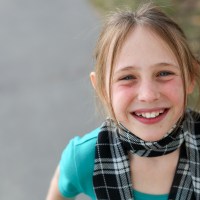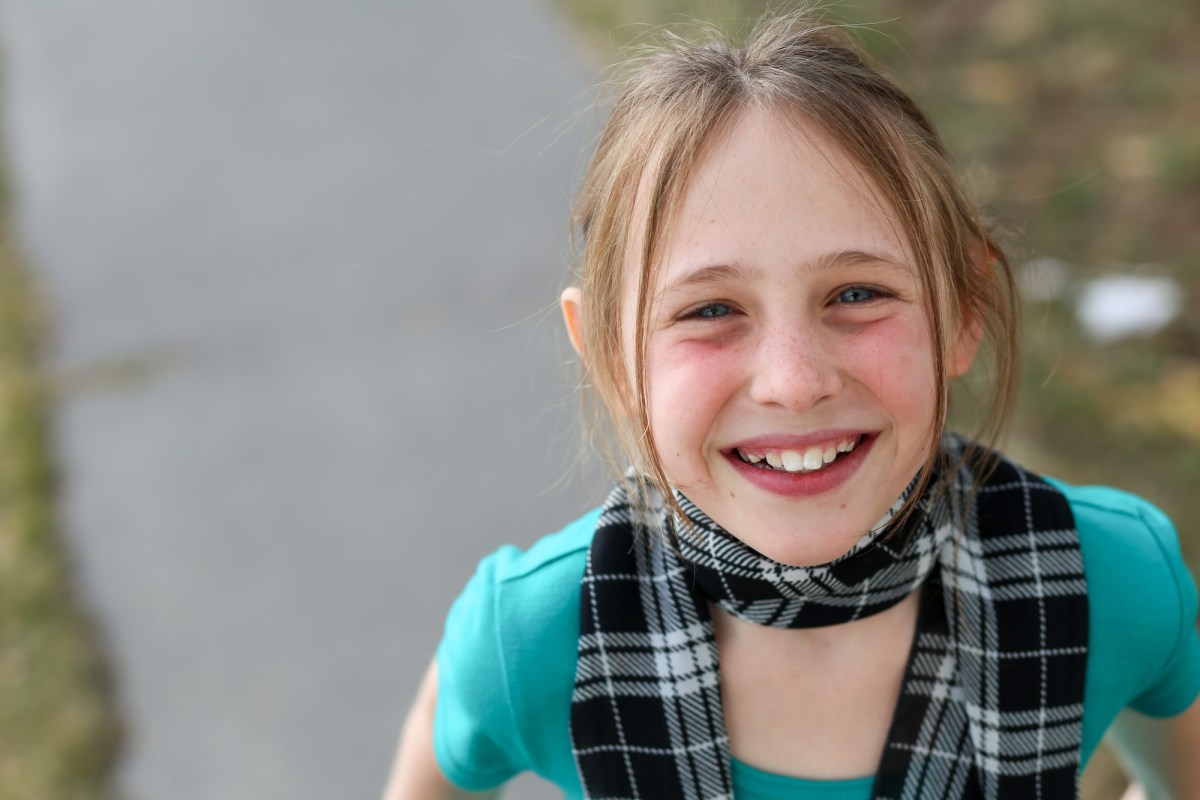I could feel her nervousness as she walked to the front of her 3rd-grade class… but only because I’m her mom. To everyone else, she appeared perfectly calm as she connected her school iPad to the projector and pulled up her Keynote presentation. The first slide popped up:
“The Syrian Refugee Crisis.”
At 9 years old, she looked way too small for such a big issue. Thankfully, she didn’t feel too small.
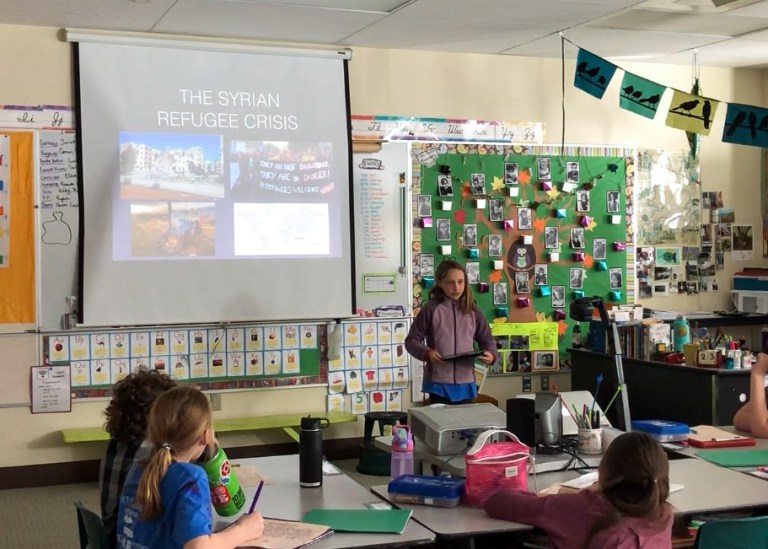
At my kids’ school, third-graders do “passion projects.” It gives students like my daughter the chance to explore their interests, learn how to put together a presentation, and practice public speaking.
They can pick any issue they want—one little girl did a presentation about why plastic bags should be banned, another kid discussed shrinking whale populations, another did something on butterfly migrations.
But my kid literally picked the hardest social issue in the world: the Syrian refugee crisis.
To my shame, when she first brought up the idea, I tried to talk her out of it. I was afraid of the stories and images she would find while researching it. I was afraid of how the tragedy of it would affect her heart and mind. I was afraid she might get discouraged by the complexity of it or the lack of concrete answers.
They were all worries that highlighted my privilege—9 year-olds in Syria (and many other places) don’t get to choose what they’re exposed to.
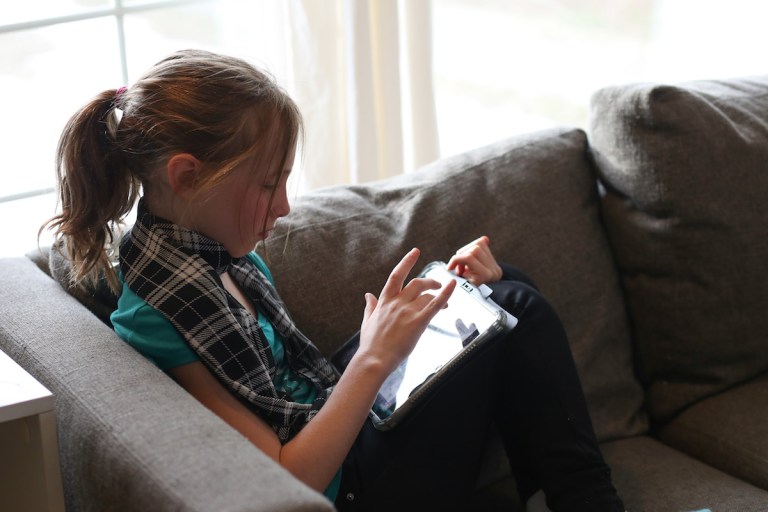
To her credit, my daughter refused to take no for an answer. She was doing this project, with or without my help. So I finally gave in.
Over the course of the next six weeks, we talked a lot about Syria. I pulled up the Preemptive Love blog and videos and read her stories. I showed her pictures of Syria before and after the war; she was blown away by how beautiful it used to be. I helped her find infographics about how many people have been displaced by the Syrian conflict, and we discussed the difference between a “displaced person” and a “refugee.”
We talked about ISIS, the Syrian government, and opposition forces. I explained that it’s a complicated war and that it’s not as simple as good guys vs. bad guys. (Note to my fellow parents: using the term “rebel forces” was particularly confusing due to its use in Star Wars. Learn from me… find a different term.) 
Then, last Friday afternoon, I sat in the back of her classroom in a child-sized chair, bursting with pride.
“Did you know that Syria’s people are dying because of war?” she asked her classmates. “In Syria, millions of people have had to flee their home due to violence. Some places in Iraq are affected too.”
“This is my passion because I care about people who are dying because of war. I think it’s tragic and scary for people who have to flee their homes and leave everything behind.”
She gave statistics and numbers and told stories to make it personal. She explained where refugees are going (“Lebanon, Turkey, Jordan, Egypt, Germany, and many other places”) and why some countries might not want to let refugees in (“Some people don’t want to get involved in other people’s problems, some people think refugees are terrorists, and most countries don’t want to spend money on refugee families.”).
I loved when she explained that Syria wasn’t always full of destroyed buildings: “Before the war happened, Syria was such a beautiful place! The buildings were tall and shiny and the weather is amazing! People actually live and have homes there. It doesn’t seem fair to me that millions of people have to be separated from their homes and families.”
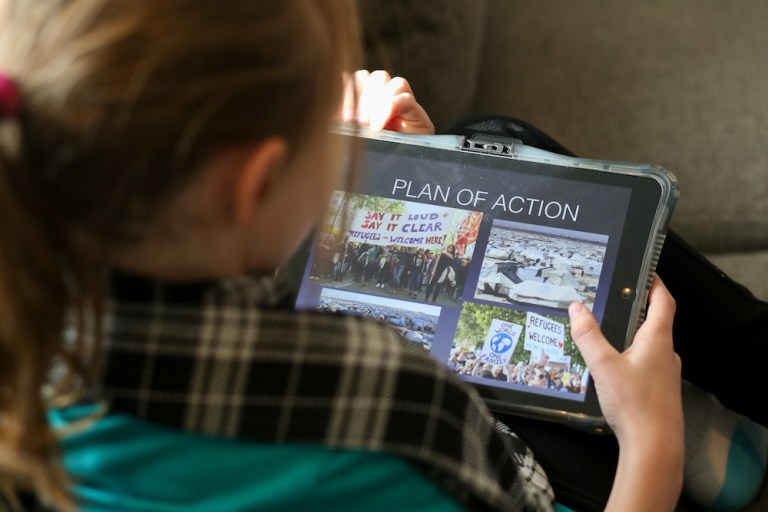
She also gave her friends practical, realistic ways to help:
“This is a very big problem. It cannot be solved easily… the fighting needs to stop. But we can help displaced families in many different ways. Parents and their kids can set up fundraisers to help raise money for displaced families who have nothing or for organizations who are helping. For example, Preemptive Love Coalition is one group helping in the region. Some people can go to church and pray that the displaced people will be alright.”
Then she issued this call to action: “Take a few minutes to think about how you would feel if you had to leave your home. If we spread the news to other people, hopefully more people will know and care about this sad situation.”
But my favorite part was her conclusion:
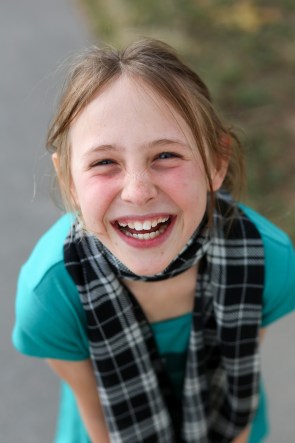
“Even though I’m a nine-year-old girl, I can help support refugee families in many different ways… Every one of these people are our brothers and sisters, and every day more refugees are dying and becoming displaced. We can help make Syria beautiful again. We can work harder and harder. We can make a difference.”
She delivered the last line looking up at her friends and the classroom erupted in applause. Her teacher asked if there were any questions and my heart dropped for a second—afraid her classmates wouldn’t understand such a big issue or wouldn’t care about something that feels so far away.
Instead, every hand shot into the air.
A proud smile crept onto my daughter’s face and I completely lost it in the back of the room. Tears streamed down my face as her friends asked question after question and she gave out answer after answer. None of these kids had ever heard of Syria—they had no idea this was happening. Not only did she educate them, she made them care.
THAT, what my kid did, is the first step toward peacemaking. People can’t wage peace if they don’t know there’s a war going on! You can’t care about a problem you don’t know about!
But also, people can’t learn about an issue if every piece of information they get makes them feel stupid, ignorant, judged, or not woke enough.
In five minutes, my nine-year-old managed to cover refugee policy, ISIS, religion, and war without being polarizing. She summed up the hardest problem on earth, made people care, and empowered them to do something about it, without making them feel stupid for not knowing about it or guilty for not doing something sooner.
I drove home vowing to be more like my kid. Determined to talk about things that matter in ways that are educating, inspiring, and empowering. Convinced that even though I’m a 33-year-old mom, I can make a difference.
Peacemaker Friday is published weekly to share stories of people unmaking violence around the world. Be inspired. Take Action.

